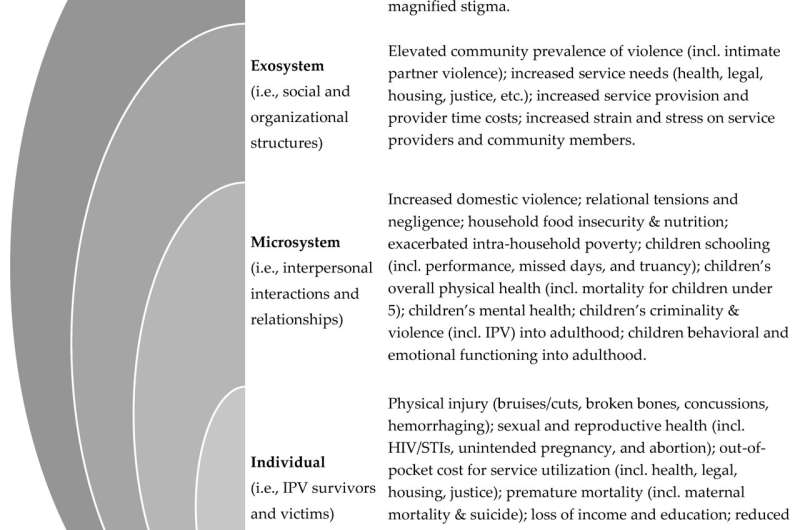This article has been reviewed according to Science X's editorial process and policies. Editors have highlighted the following attributes while ensuring the content's credibility:
fact-checked
peer-reviewed publication
trusted source
proofread
Multipronged approach needed to combat intimate partner violence in humanitarian settings

Intimate partner violence is pervasive in humanitarian settings and its impacts are far-reaching, finds a new study from the Brown School at Washington University in St. Louis.
"We demonstrated that intimate partner violence was significantly associated with a range of adverse health and non-health impacts for individuals and family members," said Lindsay Stark, a professor at the Brown School.
Stark is senior author of the paper "Identifying the Impact of Intimate Partner Violence in Humanitarian Settings: Using an Ecological Framework to Review 15 Years of Evidence." The paper is part of a special issue of the International Journal of Environmental Research and Public Health titled "Intimate Partner Violence and Mental Health in Low- and Middle-Income Settings." Stark served as guest editor of the special issue, along with Ilana Seff, a research assistant professor at the Brown School.
Stark and her co-authors found that more research is needed to examine the impacts of intimate partner violence in areas of conflict or other humanitarian emergencies on multiple levels, including the individual, family, community and society. Some current humanitarian settings include the refugee crises stemming from the conflicts in Ukraine, Syria, Afghanistan and the Democratic Republic of Congo.
"While much of the existing evidence on the impacts of intimate partner violence in humanitarian settings looks at individual outcomes (physical injury, HIV and STIs, or sexually transmitted infections, diminished social capital and decision-making) and impacts within the household (food insecurity, child health and school participation) additional research is badly needed to better understand the communal and societal impacts of intimate partner violence," Stark said.
Intimate partner violence is a pervasive form of gender-based violence that exacerbates in humanitarian settings. It includes violence that occurs within an intimate relationship of romantic partners or ex-partners, whether living together or not.
Stark has spent more than 20 years leading applied research with operational agencies such as UNICEF, the International Rescue Committee and the Women's Refugee Commission. Her research evaluates interventions to reduce violence, abuse and exploitation of women and children.
"Research is also needed to understand the additional burden of intimate partner violence perpetrated in volatile conflict settings, where supports, services and other resources are lacking," Stark said. "For example, our recent analysis in Colombia demonstrated that nearly 40% of the economic burden of intimate partner violence was from the small sub-population of women and girls who were conflict-affected, or living in areas impacted by violence and war. This kind of information can be vital to advocacy efforts and to governments committed to making evidence-based investments."
Stark and her co-authors, including Seff, conducted a systematic review of 133 peer-reviewed articles between 2005 and 2020 that examined the impacts of intimate partner violence in humanitarian settings. "Without continued research and investments in interventions, the global response to intimate partner violence in humanitarian setting will continue to lag," Stark said.
"An understanding of the health and non-health impacts of IPV among survivors and, importantly, their families and communities, is critical for programming to thwart the widespread harms of intimate partner violence."
More information: Melissa Meinhart et al, Identifying the Impact of Intimate Partner Violence in Humanitarian Settings: Using an Ecological Framework to Review 15 Years of Evidence, International Journal of Environmental Research and Public Health (2021). DOI: 10.3390/ijerph18136963
Journal information: International Journal of Environmental Research and Public Health
Provided by Washington University in St. Louis




















